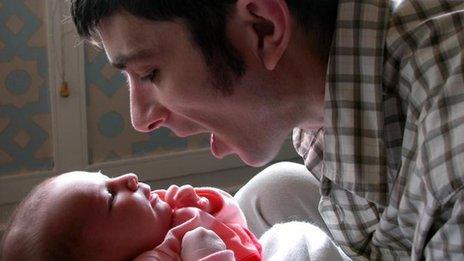Fifth of working fathers 'would rather look after baby'
- Published

More than a third of the men who work full-time said they had no flexibility in their working hours
More than a fifth of men wish they had looked after their children rather than returning to work, researchers say.
More than a third of men questioned told researchers that they worked full-time and were offered no flexibility at all by their employers.
The study also found that 80% of women feel "guilty" about going back to work after having children.
The survey was commissioned to help launch the Work and Family Show, which begins in London today.
Researchers sent questionnaires to working parents and expectant parents whose details were on the the databases of My Family Care and the Baby Show.
It was carried out online last month, with 1,000 people responding.
'Guilty and worried'
The survey suggests women find it harder than men to return to work after starting a family, but that significant numbers of fathers also have concerns.
More than 80% of women respondents said they felt "guilty going back to work and leaving my child", and worried about leaving their children in the care of others, compared with just 39% of men.
However, only 24% of women said that they wished they had not returned to work, with 22% of men saying the same.
More than 20% of women said they felt less confident in their abilities when they did return to work, compared with less than 2.5% of men.
Only around 20% of men and women said they could agree with the statement "I have found a balance and feel that I have it all".
More than 43% of women respondents said they did "most of the domestic chores", compared with just 27% of men who said the same.
The Fatherhood Institute, a charity which describes itself as "the UK's fatherhood think-and-do-tank" says the survey's results "fit with previous evidence".
"It is men, not women, who are most dissatisfied with their work-life balance," said Adrienne Burgess, the institute's joint chief executive.
"They're more likely than mums to be in full-time paid employment, and to be the sole or main breadwinner. Full-time working men also work longer hours on average than their female counterparts, and tend to have longer commutes," she said.
"Crucially, few employers have strategies to support the men in their workforce to combine their work and domestic commitments.
"As a result, men are less likely to request flexible working, and if they do, are less likely to get it."
'Inspiration and ideas'
The survey was conducted by My Family Care, one of the organisers of the show.
Its director, Ben Black, said that "more companies than ever before" had introduced measures to help their employees balance their careers with the needs of their families, but he believes more can be done.
"Today, over 2.2 million parents are not working in order to look after their family. However, more than 60% are looking to return to work but do not know how to, or are scared of how they will manage to look after their children and focus on work."
The Work and Family Show opens in London today, alongside the Baby Show.
The event's organisers say it aims to give working parents "practical advice, inspiration and ideas to help you create a happy and healthy work-life balance".
Jenny Willott, the Minister for Employment Relations and Consumer Affairs, will be taking part in a panel discussion at the show.
The government says it is keen to encourage employers to introduce more flexible working, and points to its policy of shared parental leave as a measure that can help working families achieve a better work-life balance.
- Published30 January 2014
- Published24 October 2013
- Published23 January 2014